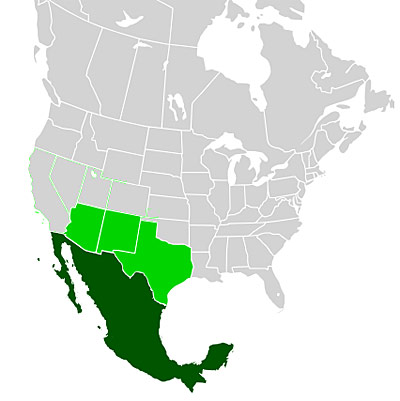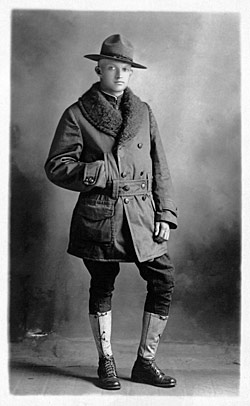
Unit 5: Crisis and Change
Lesson B: Global Effects of a Total War
Activity 3: The United States Joins the War
Many citizens of the United States called for the U.S. to join the war against Germany in 1915 when a German submarine sank a British passenger ship, the Lusitania, and thereby killed over 1,000 civilians, including 128 Americans. The United States government, however, maintained an isolationist policy for another two years, and avoided entering into the war.
In 1917, U.S. government officials intercepted a telegram from Germany's foreign secretary, Arthur Zimmerman. The Zimmerman telegram promised the Mexican government aid from Germany to retake land lost to the United States in the Mexican-American War. The citizens of the United States saw this as a direct threat, and, in early 1917, the United States Congress declared war on Germany.

Shown Here are the Territories Promised to Mexico in the Zimmerman Telegram [1]
Declaration of War
In April, 1917, the first U.S. troops arrived on the Western Front to aid the Allies. Within a year, over 2 million "doughboys" – as the U.S. troops were known – surged into France to push back the German army. The arrival of the United States tipped the balance in favor of the Allies and broke the stalemate. Exhausted German troops mutinied (revolted) in late 1918. On November 11, 1918, representatives from Germany and France signed an armistice, an agreement to stop fighting.

Wartime Era Portrait of a Typical American Doughboy Hugh A Ball, circa: 1918[2]
Directions: The following is a quote from President Woodrow Wilson's speech to Congress requesting that the United States join the Allied war effort. Read the text of the speech and answer the questions that follow.
President Woodrow Wilson's Speech to Congress
The world must be made safe for democracy. Its peace must be planted upon the tested foundations of political liberty. We have no selfish ends to serve. We desire no conquest, no dominion.
Source: http://historymatters.gmu.edu/d/4943/
Written Activity - Notebook
In your notebook, respond to the following questions:
- What is the tone of Wilson's speech?
- How does President Wilson justify sending troops into World War I?
- Do you believe that the United States should have joined the war before 1917? Why or why not?
- Why do you think the United States avoided joining the Allies in World War I until 1917?
Page Notes:
[1] Source: This image from http://commons.wikimedia.org/wiki/File:Zimmermann_Telegram_alt.png is licensed under the terms of the GNU License Agreement.
[2] Source: This image from http://en.wikipedia.org/wiki/File:HAB_ww1_1918.jpg is in the public domain.

